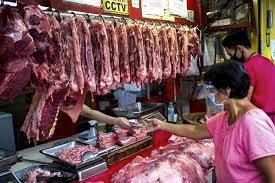|
The Wednesday April 7th edition of CHICK-NEWS noted the inability of the Government of the Philippines to control African swine fever (ASF) resulting in a shortage of pork especially in metropolitan areas. As a result, pork prices have soared with shortages appearing immediately after the government ham-handedly (no pun intended) placed a temporary cap on retail prices. Apparently President Duterte has not learned the reality that a cheap food policy immediately devolves into a no-food policy. As a result of ASF, pork production has dropped 20 percent with culling of 300,000 hogs based on unreliable government data understating the magnitude of the problem.
|

"This little Piggy went to Market" |
|
Bowing to pressure, the Philippine Government reduced the import duty on pork from 30 percent to 5 percent effective immediately for three months with a rise to 10 percent thereafter. It is estimated that the Philippines will have to import 400,000 metric tons of pork in 2021, double the 162,000 tons predicted at the beginning of the year. Despite the heavy import duty, the shortage of pork in the Philippines resulted in a 600 percent increase in shipments from the U.S. during the first quarter of 2021. According to the U.S. Meat Export Federation, pork shipments to the Philippines attained 15,000 metric tons through March 25th
 The Department of Agriculture intends initiating a repopulation program for hog farms. This will be playing King Canute in the absence of an effective and safe vaccine that at present is unavailable. As with China, commencing in 2018, interim control of ASF required a radical restructuring of pork production moving from small family-operated farms to larger commercial units capable of imposing strict biosecurity. The current system of production in the Philippines involves family farms selling to dealers who in term aggregate hogs to be sold and shipped to packing plants. This requires extensive movement and obvious dissemination of ASF virus. The Department of Agriculture intends initiating a repopulation program for hog farms. This will be playing King Canute in the absence of an effective and safe vaccine that at present is unavailable. As with China, commencing in 2018, interim control of ASF required a radical restructuring of pork production moving from small family-operated farms to larger commercial units capable of imposing strict biosecurity. The current system of production in the Philippines involves family farms selling to dealers who in term aggregate hogs to be sold and shipped to packing plants. This requires extensive movement and obvious dissemination of ASF virus.
Not only will the Philippines have to import pork over the intermediate and long term, the domestic broiler industry will not be capable of providing additional animal protein The Philippines will represent a potential market for U.S. leg quarters subject to the government further relaxing restrictions on imports. This is resisted by the domestic industry that has lobbied for exclusion. The Philippines increased imports of broiler parts rising to 6th in rank among importers from the U.S. over the first two months of 2021. A total of 28,102 metric tons was shipped, valued at $22.1million with a unit value of $786 per ton. Exports were 31 percent higher in volume compared to the first two months of 2020.
|